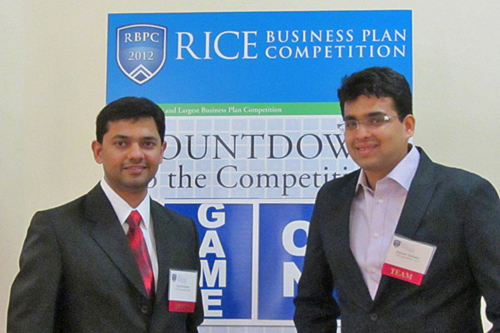T3D goes beyond Hen Hatch, places among top collegiate startups worldwide
T3D Nanotech, LLC, a high technology startup company spun off from patent pending nanotech research at the University of Delaware, was recently awarded $1,000 in UD’s Hen Hatch competition. But that award was preceded by another honor: selection to participate in the 2012 Rice Business Plan Competition (RBPC).
As the world’s largest and richest business plan competition, the RBPC supports the creation of new startup companies and brings together business and engineering students from the world’s top educational institutions with successful venture capital investors, entrepreneurs and business leaders.
Out of a pool of 1,600 applicants, T3D gained entry to the top 2.6 percent of just 42 teams invited to compete for more than $1.5 million in prizes.
Team members Sean Gilligan, an MBA student in the Alfred Lerner College of Business and Economics; Vinu Krishnan and Sameer Sathaye, doctoral candidates in the Department of Materials Science and Engineering; and Jill Royston of Teleos Consulting, traveled to Houston for the April 12-14 event.
“Despite being a six-month old company T3D’s entry to the RBPC is significant and validates our goals and aspirations in establishing Delaware’s first student life-science venture,” said Krishnan, T3D’s chief science and technology officer.
“To our knowledge, T3D was the youngest company to be selected for this event while most of the other contestants were well established into their ventures for more than a year,” added Gilligan, T3D’s chief operating officer. “This validates our path forward and the guidance we have been receiving along the way.”

Vinu Krishnan (left) and Sameer Sathaye at the Rice Business Plan Competition. Image credit: University of Delaware
After presenting a 15-minute business plan and competing in a rapid fire 60-second elevator pitch contest on the first night of the competition, T3D left with a third place win in the “Shark Tank Round” of the contest, $600 in prize money and the honor of representing UD among the top collegiate entrepreneurs in the world.
The team also appeared in a photo on page 72 of this week’s Fortune magazine article.
“Based on the judges’ feedback we were successful in validating the concept of our technology, identifying potential opportunities and demonstrating strong management capability supported by an outstanding advisory board,” said Krishnan.
Added Sathaye, T3D’s chief marketing officer, “the competition gave us real-world experience to fine-tune our business plan in terms of financial understanding, investment potential and marketing opportunities. It made us more confident and significantly enhanced our passion for growing this business.”
Krishnan said T3D’s next step is to build the team with people who share their enthusiasm and can effectively contribute to the success of the venture at various levels.
“While securing funding support we also intend to complete the pre-clinical validation in less than two years,” said Krishnan.
T3D expressed appreciation for the various UD faculty who have offered support including Scott Jones, professor of accounting and faculty adviser to T3D; John Rabolt, professor of materials science and engineering; and Dan Freeman, professor of business administration and director of the Entrepreneurial Studies Program. The team also thanked the Office of Economic Innovation and Partnerships for funding the trip to Houston.
About T3D
T3D Nanotech, LLC, is a startup company spun off from patent pending nanotech research from UD. The technology was created by Ulhas Naik, professor of biological sciences and director of the Delaware Cardiovascular Research Center, and Peter Millili, a former graduate student in the Department of Chemical and Biomolecular Engineering at UD.
For oncology patients who want a safer and more effective cancer treatment, T3D develops revolutionary nanotechnology-based therapies that provide treatment with greater specificity, versatility and efficacy while enhancing quality of life.
The company remains on the lookout for initial venture/angel capital as well as government grants.
– Article by Kathryn Meier
*Source: University of Delaware
